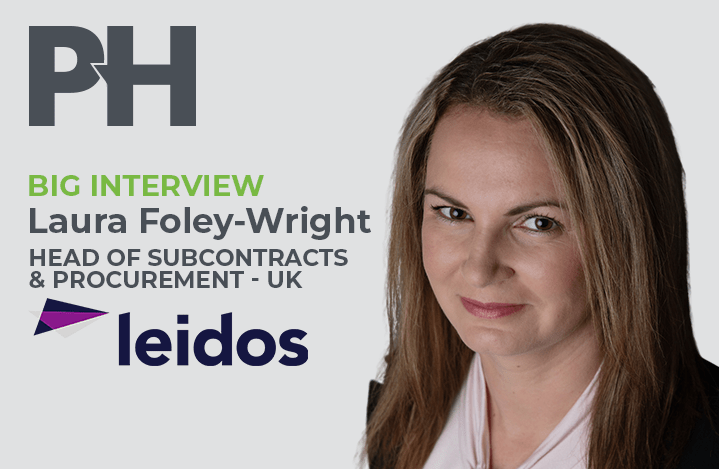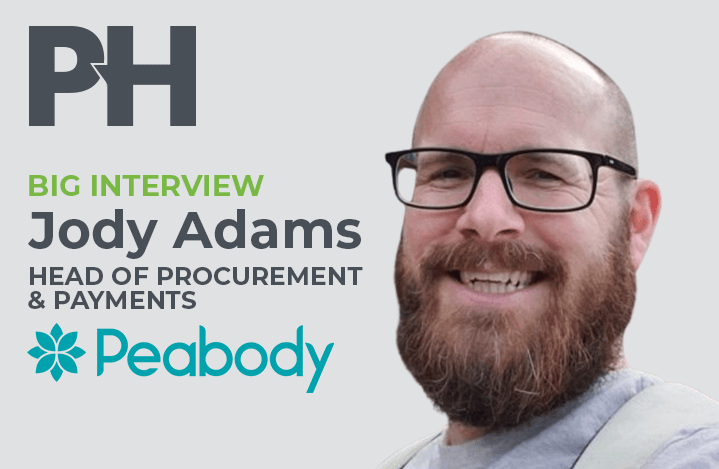She recently spoke with Procurement Heads about her procurement career.
How did you get into procurement?
It was pretty straightforward, at school, I did subjects like mechanical mathematics and physics but I also did business and economics and was encouraged at that time into business rather than engineering.
I completed a degree in economics followed with a graduate placement role at BAE Systems in their Procurement and Subcontracts team, it seemed a good use of my degree. The graduate scheme allowed me exposure to everything that was related to procurement and it inspired me to do my procurement Master’s.
I love procurement – I think it is quite a logical area and you can see the value, you need the relationships with suppliers and customers and the tiers within the whole supply chain.
What inspires you as a procurement leader?
I am really lucky, I have an amazing team. They all bring different values every day as unique people.
I love a quote for inspiration, I have a set of postcards on my desk and throughout lockdown, I have sent them out to my team.
When I applied for this job I saw something on social media, ‘If someone gives you an opportunity, say yes and work out how to do it later’ and that was it, I was like right yes I am going to send my CV in!
My team give me energy, you have those who are dedicated, you have those that are innovative and ambitious, and some approaching the end of their career with so much knowledge to share. For me each team is unique and we are well balanced and I love the way the millennials think and the way that people with experience think.
You are a product of the people you engage with and the broader you can make those people, the wider the mind goes.
Who has inspired you throughout your career?
I have had some really good mentors, an HR Manager who was so great at helping me discover confidence in my skills; a really good manager based in America who stretched me beyond the transactional side of procurement, past the administrative into the strategic elements – with a good dose of compliance incorporated too!
I have had mentors encourage me to further my studies, by doing my Master’s and continue learning and growing.
My kids inspire me too… if I could keep the negotiation skills of a five-year-old, what a difference that would make!
What skills do you consider essential to be a procurement leader?
People skills and attention to detail. Often it is the little things in procurement that can lead to risks. Take the time to learn everything you need to know. Reach a good agreement that works for both parties. procurement is more than just buying it is about developing and retaining a relationship long term. Everybody brings their own background to it. If you can make sure everything is accurate that is a really good skill to have.
I try and bring as much of myself to work, by aiming to be a really authentic person, my team know as much about me as they want to, some people don’t want to bring their life to work but being authentic you can’t go wrong.
What have been your best and worst business decisions?
My worst was when I was under a lot of pressure to close a deal, we closed it knowing the risks, but I have been living with the consequences ever since.
It is worth taking the time to get a deal on the table that works for everybody. There were too many open risks left to be addressed later, and later is often too late! It was the balance between it needed to be done and getting the right deal. Since then I really encourage my team to take extra time if it is needed and that you need to manage your internal stakeholders to make sure that the best deal is made. You learn your lessons and apply them going forward.
Often in procurement, we become orientated to one supplier when you have an agreement in place, but one of the things I did early in my career was to have to go out for a second source of supply. This was one of the best decisions but not the easiest. People don’t often step back to the start of the cycle. My best decision at that point was going back to the start. It worked for us, but it took quite a bit of effort – never be scared to start again.
What advice would you give someone who was embarking on a procurement career?
Be ready to be flexible, every day has new challenges, 20 years in and there are still new challenges for me.
Just like COVID, the impact has been huge in the environment we are working in, people prepared for business continuity but it never became real. We bring so much value and we are really important elements of an organisation -you have to be smart and considered when spending the company’s money as that is what is keeping your business going.
Be flexible and understand that things may change. When I started we were faxing purchase orders or putting them in the post, the role has moved on a lot since then! It is using the tools that are out there. Attention to detail and good ethics.
What advice would you give women setting out?
Have faith in your abilities. More often than not women have to prove themselves as there is an unconscious bias. If you have faith in your skills, you keep challenging your perception of your limits and everyone else’s.
I think as long as we are all aware of the biases we can address them. I can be a bit stubborn, I just want to do a good job and deliver value. I have some positives in the so-called stereotype but I also have the negatives.
I didn’t get a step-up career-wise but I have had some good mentors who have seen potential in me. You need everybody, you need a diverse team and everybody needs to know the value bought by each member of the team.
Hopefully, we will reach a time where we don’t have to consciously think about the differences to then embrace them, by the time I retire I would love to think that we are not having to compare people for their differences, that is the idea, that everybody is included and is respected for being an individual and their uniqueness.
What do you look for when hiring?
I like people who can inspire everybody else. You have to look beyond a task in hand. I hopefully hire people that won’t just transact, those people who aren’t afraid to suggest changes. We embrace the agility to make changes and the team does too. I look for people who can also multi-task as no two days are the same!
What do you think are the current procurement trends and hot topics and what emerging roles do you think we will see as a result?
Social value I think will become a really hot topic and security of supply has been highlighted through lockdowns, be it toilet rolls or laptops!
Understanding how each of your supply chains works, you need to go deeper. It is checking people can still deliver the services. If we are buying the services of a person who is struggling, the company is then going to struggle to supply.
We do a lot of cybersecurity which is also going to be key going forward. I think linked to that we will see supplier assurance roles and relationship manager roles have grown a lot in the last five years. It used to be the best practice, but now it is core to a procurement function.
What are your team and organisation doing with regards to sustainable procurement?
A lot of our procurement at Leidos UK is around service rather than a product. We need to look at how we make things safer, healthier and more efficient. We look at people and community as much as the environmental aspects.
Working with universities, being inclusive and employee wellbeing are all things that will make a sustainable market. It is also about ethical decisions, you need to look at conflict, human trafficking, fraud and things like that so that our whole supply chain is sustainable for the future.
So it is broader than just environmental in our business. We get awarded each year with an Ethisphere Award, we have a really good focus on ethics through the organisation.
It is about getting ready for the future if you don’t engage with the SMEs who are bringing innovation and new ideas and you could miss that. We ask the right questions of our suppliers, they are the experts in what they are providing – if you work with them you will both get greater value.
What do diversity and inclusion mean to you?
It is everything that makes a person unique. If you can challenge individual biases then you can make a change. I have got things that will give me a head start – a university degree and my ethnicity. I also have things that give me a bit of an anchor as well – I am an introvert, I’m dyslexic and I’m female. These things all make me individual and valuable as a procurement professional they shouldn’t be an anchor.
Does Leidos have diversity programmes in place?
Yes, Leidos is really strong on values. At the start of this year, we put in an extra value of inclusion, which is important and is ingrained in everything we do.
We have a series of programmes including diversity, we have employee resource groups, we have a women’s network, a millennials group, a STEM group and lots of others. The Inclusion value that came in was as a result of an employee survey. This one drives the way we behave. In Leidos, “Inclusion is fostering a sense of belonging, welcoming all perspectives and contributions and providing equal access to opportunities and resource for everybody.”
We have a lot of training and awards, it is not just written down it is engrained in everything we do.
I said social value is key for the future and a lot of that is coming from our communities. Leidos has put a lot of programmes in place and ingrained it into all aspects of our business.
I would much rather work somewhere diverse and inclusive.
What challenges have you faced as a woman in the industry?
I have been told to wear a shorter skirt in negotiations, that I shouldn’t go back to work full time after having a baby and that I should prepare for a career plateau. The skirt one was quite early on in my career. I haven’t seen as many challenges recently which shows we’ve all turned a corner.
Procurement is a very balanced function in Leidos. I have definitely come through the era where women faced significant challenges and I can see the improvements but I am very lucky to work for a company that sees inclusion and diversity as key in delivering value to our customers.
What is your view on how women are represented across the profession?
The proportion of women to men is unbalanced although I have worked with some amazingly competent women. There are so many capable women out there and we need to make them realise that procurement is a really brilliant career.
I have only recently seen that I can be an example to people, if I can be an advert for it then that is great. If I can mentor people and encourage people and boost their confidence to step forward and take the risk and the chance then that is great.
I have done a couple of career days at local schools which opens your eyes to stereotypes. It is unbalanced, there are definitely more men in suits. It is getting out there and making people see that if they want to be in business then they can be.
I wanted to go into engineering but I was encouraged to go into business as it was less risky. I want to encourage women to just go and do what they want. I work in an IT industry but you could work in procurement for your favourite store, how amazing would that be!
It is now strategic, you go wider you help clients and you push innovation.






